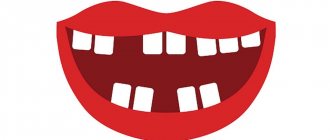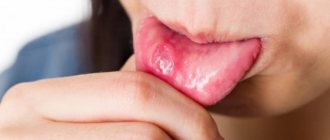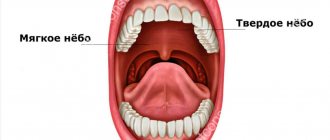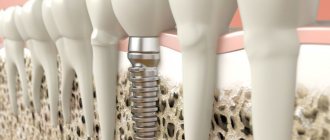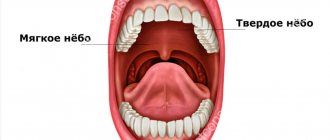Dental problems
Dental diseases
With deep caries and its complications - pulpitis, periodontitis - the pain radiates to the jaw in the area of the affected tooth.
Infectious and inflammatory processes of the soft tissues surrounding the tooth - periodontitis, abscess - cause swelling, which, by squeezing the nerve endings, provokes the appearance of painful sensations in the jaw.
With increased tooth sensitivity, eating hot, cold, spicy, sour or sweet foods and drinks, and brushing your teeth cause acute pain that spreads to the jaw.
When third premolars - wisdom teeth - emerge, complications often arise: pericoronitis, inflammation of the periosteum, one of the symptoms of which is severe pain in the jaw.
Dental treatment procedures associated with violation of tissue integrity - implantation, prosthetics, tooth extraction, installation of fillings, professional teeth cleaning and whitening - contribute to the appearance of pain in the jaw.
Bruxism
With bruxism, involuntary grinding of teeth at night significantly increases the load on the masticatory muscles, which leads to their prolonged spasm. In this case, the correct occlusion of the dentition is disrupted with the development of pain in the jaw when chewing.
Temporomandibular joint problems
If pain occurs in the jaw when opening the mouth, this is a symptom of temporomandibular joint pathology.
Pain in the projection of the jaw is often accompanied by pain in the ear, head, and face. The causes of joint dysfunction are injuries, malocclusions, incorrectly installed dentures, arthritis, arthrosis, and hypertonicity of the masticatory muscles.
Tumors of the lower jaw
Pain in the jaw area is characteristic of benign and malignant neoplasms. Benign tumors are characterized by slow growth and lack of invasion into adjacent tissues and organs.
Malignant neoplasia rapidly progresses, pain intensifies with irradiation into the eye, temporal region, ear, jaw.
Head and jaw hurt
According to doctors, pain in the head and jaw can occur simultaneously. Similar symptoms are caused by dental pathologies. Sometimes the problem can be caused by pathologies of the visual organs, blood vessels and ENT organs. The article will describe the reasons for this phenomenon.
- Malocclusion
Pain in the jaw and head can be caused by impaired jaw closure and the functioning of the masticatory muscles. Bite pathologies can lead to scoliosis.
- Caries in an advanced stage
Pain caused by inflammatory dental diseases (caries, pulpitis, granuloma) is felt in the jaw and the area of the affected unit. Initially, discomfort occurs due to temperature or mechanical influence. At an advanced stage, sharp pain occurs independently and radiates to adjacent areas.
- Edentia or damaged elements
With partial edentia, neighboring teeth and nearby muscles are subject to intense stress. The patient has to adapt and chew food on the healthy part of the jaw.
- Availability of orthodontic and orthopedic products
Pain may occur after placement of bite correction devices. This is a normal condition when the dentition gets used to a new position. Unpleasant sensations arise due to the pressure of the structure on the teeth. The discomfort goes away within a few weeks.
There should be no pain or discomfort during prosthetics. This indicates the low quality of treatment.
- Strong galvanic currents
The occurrence of galvanosis is due to the movement of galvanic currents in the mouth and their intense influence. The anomaly is typical for patients with metal prostheses in the mouth. The reaction occurs due to an allergy to metal alloys and non-compliance with production technology.
- Bruxism
An involuntary phenomenon at night. Manifested by excessive clenching of the jaw. People learn about pathology from their relatives. Patients experience fatigue and tension headaches in the morning. Teeth are brittle and have worn out enamel.
- Dental treatment
Patients note such negative phenomena immediately after treatment. Discomfort occurs after therapeutic manipulations and surgical interventions. This is due to stress, prolonged stay in a position with an open mouth, and the traumatic nature of the doctor’s actions.
- Erupting wisdom tooth
The third molar, as it passes through the jawbone, exerts pressure and irritates the nerve endings. The pain is blurred and spreads to the entire jaw, radiating to the temples and head.
It is worth going to the dentist and getting an x-ray. Third molars may be impacted or dystopic. Such elements provoke crowding of the jaw row, malocclusion, pericoronitis, accompanied by pain and discomfort.
- Complications after surgery
Surgical procedures are accompanied by pain, swelling and other manifestations. Gradually the unpleasant sensations subside. If acute pain remains 3-4 days after treatment, this indicates complications. Alveolitis develops - inflammation in the diseased socket. In the absence of timely treatment, there is a risk of developing flux, abscess and osteomyelitis.
Doctors are sure that pain in the head or jaw is sometimes mistaken for toothache.
- Subluxations and dislocations
Develop due to arthritis or joint disease. The problem can be caused by excessive opening of the mouth and displacement of the articular head of the lower jaw. Soreness is felt in the head, temples and cheeks.
- Trigeminal neuralgia
When the trigeminal nerve is damaged or inflamed, acute pain is felt like a migraine. The patient experiences discomfort in the jaw.
- Diseases of the ENT organs
Sinusitis, tonsillitis and other ENT diseases are disguised as dental problems. Otitis media provokes intense pain in the head and jaw. Identical symptoms are characterized by sinusitis and sinusitis. This is due to the close location of organs and the spread of pathogens through the bloodstream.
- Cluster headache
Characterized by pain in the upper jaw area. Acute pain is mistakenly mistaken for manifestations of pulp inflammation or periodontitis.
- Viral, infectious diseases, hypothermia
Hypothermia or ARVI can provoke a migraine. Associated symptoms characteristic of infectious diseases occur: hyperthermia, rhinitis, cough.
- Angina pectoris
Discomfort in the heart can shoot into the arm or shoulder on the left side of the body. Occasionally, pain is felt in the head or lower jaw.
Only a doctor can determine the cause of a headache and choose the right treatment. If symptoms occur, you should contact your dentist.
Causes of jaw pain not related to dental disorders
Neuralgia
When the trigeminal nerve, which is responsible for the sensitivity of the face and oral cavity, is damaged, the pain is strong, sharp, reminiscent of the pain of pulpitis. Often patients with trigeminal neuralgia undergo unnecessary dental treatment with depulpation or tooth extraction, but the pain syndrome persists.
Sialolithiasis
Salivary stone disease is characterized by the formation of stones in the ducts of the large salivary glands. Since the salivary glands are located in the mouth, pain during their inflammation also affects other nearby organs of the oral cavity, in particular the jaw.
Sinusitis
When the mucous membrane of the maxillary cavity becomes inflamed, increasing swelling and accumulation of exudate cause pain spreading to the upper jaw area from the side of the affected sinus.
Otitis
Sometimes the symptoms of otitis media are similar to toothache. With inflammation of the middle ear, pain often radiates to the jaw. The pain is sharp, shooting, aggravated by chewing and swallowing.
Submandibular lymphadenopathy
Enlargement of the submandibular lymph nodes is observed in diseases of the tonsils, acute respiratory viral infections, stomatitis, and oncological tumors. Pain under the jaw is often accompanied by limited range of motion - it is difficult for the patient to bend and turn his head, or open his mouth wide.
Diseases of the cardiovascular system
Irradiation of pain into the lower jaw can be observed during an attack of angina and myocardial infarction. A characteristic symptom of coronary heart disease is burning, pressing pain behind the sternum. But with an atypical course of a heart attack, retrosternal pain may be completely absent, only reflected pain comes to the fore: in the left arm, in the neck, in the face, in the jaw.
Prevention measures
To avoid headaches and the causes that provoke them, you need to use the following preventive measures:
- rest and exercise;
- good sleep and frequent walks in the fresh air ;
- complete rest for the eyes ;
- proper nutrition , eating fresh vegetables and fruits;
- drink a lot of water , which saturates with oxygen and improves blood quality.
Massage, sauna, and going to the pool also have a very . These simple recommendations can be followed by every person.
Stay up to date! If you are faced with a migraine or headache, you can take a painkiller, but if the symptoms still do not go away, you need to seek help.
Diagnostics
When there is pain in the jaw, the patient first seeks advice from a dentist.
A dental examination includes the following steps.
- Clarifying patient complaints and collecting anamnesis. Since the main complaint is pain in the jaw, the time of its appearance (at night, during the day), the nature of the pain (sharp, dull, pulsating, aching), and duration (constant, paroxysmal) are specified.
- Examination of the oral cavity with assessment of the condition of the mucous membrane, tongue, gums, determination of the type of bite.
- Examination of the surfaces of all teeth using a probe and mirrors, identifying the integrity of the dentition, detecting defects in the hard tissues of the teeth.
- The percussion method is used to determine caries complications.
- Thermodiagnostics is used to identify pain reactions.
Treatment
It is worth noting! Before starting treatment for a headache, you need to undergo an examination by a specialist to identify possible causes of this condition on the right side of the head. To do this you need:
- Take an extensive blood test (such an analysis will show all possible deviations from the norm and the causes of frequent discomfort).
- Get a CT scan (CT scans can detect tumors or blood vessel problems).
- Get examined by an ophthalmologist . Even if you don't have vision problems.
Based on the test results and tomography data, the doctor will be able to prescribe treatment. If the pain continues for a short time, you can take painkillers .
Analgin, Spazmalgon, Citramon relieve pain well.
All these tablets quickly dilate blood vessels, eliminate spasms and pain.
If a person has a severe migraine , which creates severe pain on the right side of the head, then doctors recommend taking anti-inflammatory drugs .
Useful video
From this video you will learn why the right side of your head hurts and how to get rid of the pain:
A headache , especially on the right side of the head , can affect the quality of vision and cause severe pain - this is evidence of a serious illness that must be dealt with immediately .
Modern medicine can now positively solve the problems of tumors that have arisen or the consequences of serious injuries, only if you consult a doctor in a timely manner.
How else can you help yourself with these symptoms?
If you are at home, a good option would be to take a bath with pine needles or sea salt .
It is also important to try tracking your pain for two or three days. Pay attention to changes in the nature of the pain, at what time it occurs and where exactly.
If a symptom occurs on the right side of the head, the pain may occur due to an incorrect position during sleep , an incorrectly chosen and uncomfortable pillow.
And sometimes simply because of the bad habit of sitting with your head bowed for a long time , for example, at work. Eliminate these and similar, at first glance, unobvious factors, and if this is the case, then everything will soon pass.

